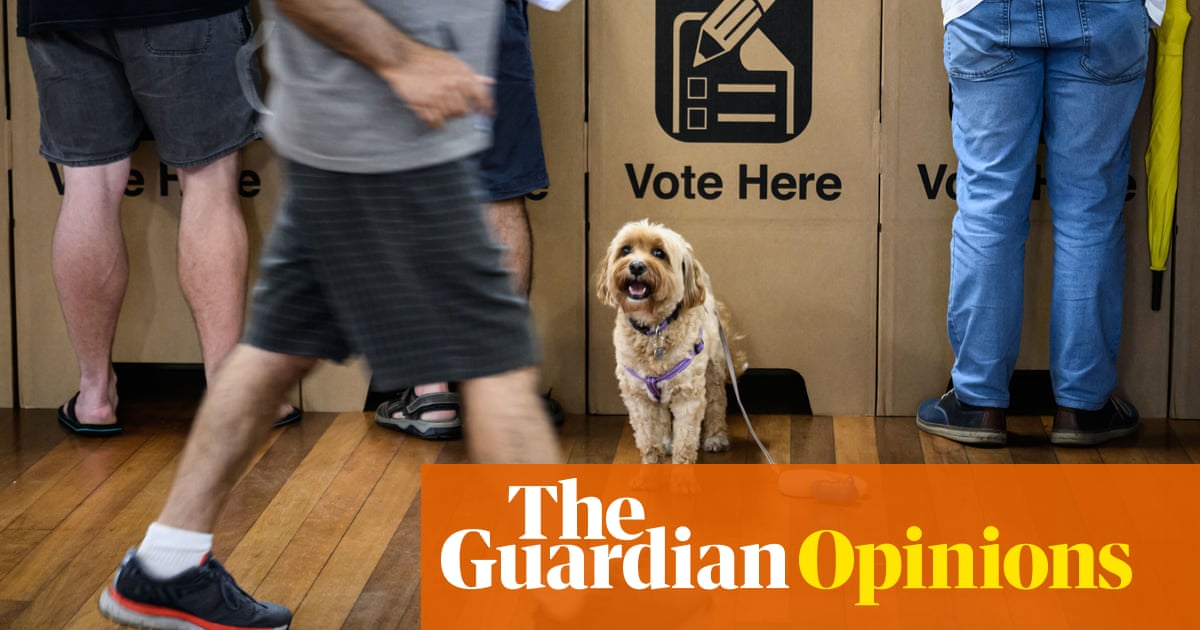When I arrived at 7am on my first polling day at the 2016 federal election, I wasn’t sure what to expect. My assigned polling place was the tiny public school in Fernleigh – population 300 – near Bangalow in northern New South Wales. When we opened the doors at 8.30am, I put on my shapeless purple vest, sat at one of two tables with my printed electoral roll, pen and ruler, and experienced a quiet, nerdy revelation: there was so much more to this job than issuing ballot papers.
Early voting wasn’t really a thing back then so civic duty flushed all eligible adults out of the hills and into Fernleigh on election day. I loved seeing farmers in worn jumpers and gumboots who looked as though they’d driven their tractors to the polling place. Women in cashmere cardigans, parents cradling cups of coffee and squirming toddlers. When I stepped out of the school hall for my first break, I was offered fresh scones and home-baked biscuits at a fundraising stall set up by a few locals.
We only issued about 200 votes in total that day, which made for a slow day, but driving the winding country roads home that night I knew I was hooked.
I’ve worked at every local, state and federal election since, in polling places big and small, as well as last year’s referendum and pre-poll this year. What started as a way to earn some extra income has enriched my life in unexpected ways.
It’s a rare thing to interact with hundreds of people a day, one at a time, and for almost all of those interactions to be positive. You meet people whose paths you might never cross in your regular life. The young Kylie Kwong-lookalike wearing rainbow-coloured glasses, bright orange lipstick on her top lip and hot pink on her bottom lip; the jittery 18-year-olds voting for the first time and not sure what to do with the ballot papers; the Bundjalung elder who does the welcome to country at local events; the white-haired couple sharing a voting booth, gently helping each other number the right boxes; people with dogs on leads, puzzled at this unscheduled stop on their morning walkies.
Sign up for a weekly email featuring our best reads
Snippets of lives make their way into our brief interactions. In between asking for their names and handing them their ballot papers, I learn that the person in front of me has just made a sea change, or lives in the local caravan park, or has just become an Australian citizen, or is flying to Europe tomorrow, or has a chronic illness (explaining the face mask she’s wearing). I hear accents from faraway countries. I meet families with adult children voting together. Others with restless kids whose small hands slide across the desk and steal my pens.
It’s not uncommon to see voters Google candidates they aren’t familiar with, but last week I met a woman who used ChatGPT to help her vote. She was from interstate so the local how-to-vote cards she’d been given outside didn’t apply. You type in what your values are and which electorate you’re in and it tells you what order to put the candidates, she told me, showing me the search results on her phone.
Seeing all these people coming out to cast their votes – on rainy days, in holiday traffic, when they’d rather be at the beach, when they doubt their vote will change anything – restores my faith in humanity and reminds me that we’re all in this together. There are blips of aggression or frustration – “None of these buggers is worth voting for,” one old gent grumbled to me, shoving his unmarked ballot papers into the ballot box in protest – but most of the people I meet are kind, friendly and ready to return a smile.
Election work restores my faith in democracy too. It’s not just that the AEC takes elections seriously, as it should, and drums into every election worker that every protocol and procedure, every security seal and witnessed signature, matters. It’s that everyone I’ve worked with over the years – from my fellow issuing officers and our supervisors to regional chiefs to trainers and hawk-eyed scrutineers – is diligent and conscientious to a fault.
Late on election night, after emptying ballot boxes and packing up voting materials, along with my 100,000 co-workers at more than 7,000 polling places all over Australia, I’ll feel exhausted but filled up somehow – and ready to sign up again next time.
Louise Southerden’s latest book,Tiny: A Memoir About Love, Letting Go and a Very Small House(Hardie Grant Explore, $34.99) is available throughguardianbookshop.com
